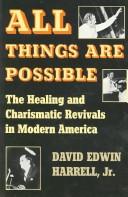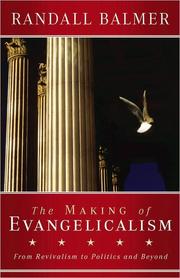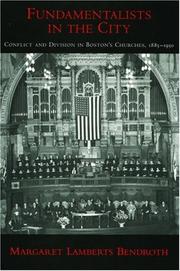| Listing 1 - 10 of 81 | << page >> |
Sort by
|

ISBN: 0253202213 Year: 1975 Publisher: Bloomington, Indiana Indiana University Press
Abstract | Keywords | Export | Availability | Bookmark
 Loading...
Loading...Choose an application
- Reference Manager
- EndNote
- RefWorks (Direct export to RefWorks)
healing --- Charismatic Revivalism --- America --- Pentecostalism --- religion and cultural
Book
ISBN: 9780773448629 Year: 2008 Publisher: Lewiston, NY The Edwin Mellen Press
Abstract | Keywords | Export | Availability | Bookmark
 Loading...
Loading...Choose an application
- Reference Manager
- EndNote
- RefWorks (Direct export to RefWorks)
Charisma --- Millennialism --- Millenialist communities --- Seventh-day Adventism --- Revivalism --- Ellen G. White --- Adventist identity --- sectarian controversy --- doctrine

ISBN: 9781602582439 Year: 2010 Publisher: Waco Baylor University Press
Abstract | Keywords | Export | Availability | Bookmark
 Loading...
Loading...Choose an application
- Reference Manager
- EndNote
- RefWorks (Direct export to RefWorks)
Evangelicalism --- United States --- History --- Church history --- Revivalism --- the First Amendment --- Postmillenialism --- Premillenialism --- subculture --- the religious right --- religion and politics --- America
Book
ISBN: 1789200431 Year: 2019 Publisher: New York ; Oxford : Berghahn Books,
Abstract | Keywords | Export | Availability | Bookmark
 Loading...
Loading...Choose an application
- Reference Manager
- EndNote
- RefWorks (Direct export to RefWorks)
In Vanuatu, commoditization and revitalization of culture and the arts do not necessarily work against each other; both revolve around value formation and the authentication of things. This book investigates the meaning and value of (art) objects as commodities in differing states of transit and transition: in the local place, on the market, in the museum. It provides an ethnographic account of commoditization in a context of revitalization of culture and the arts in Vanuatu, and the issues this generates, such as authentication of actions and things, indigenized copyright, and kastom disputes over ownership and the nature of kastom itself.
Book
ISBN: 0271086270 0271086297 Year: 2019 Publisher: University Park, Pennsylvania : The Pennsylvania State University Press,
Abstract | Keywords | Export | Availability | Bookmark
 Loading...
Loading...Choose an application
- Reference Manager
- EndNote
- RefWorks (Direct export to RefWorks)
For many, U2's Bono is an icon of both evangelical spirituality and secular moral activism. In this book, Chad E. Seales examines the religious and spiritual culture that has built up around the rock star over the course of his career and considers how Bono engages with that religion in his music and in his activism. Looking at Bono and his work within a wider critique of white American evangelicalism, Seales traces Bono's career, from his background in religious groups in the 1970s to his rise to stardom in the 1980s and his relationship with political and economic figures, such as Jeffrey Sachs, Bill Clinton, and Jesse Helms. In doing so, Seales shows us a different Bono, one who uses the spiritual meaning of church tradition to advocate for the promise that free markets and for-profits will bring justice and freedom to the world's poor. Engaging with scholarship in popular culture, music, religious studies, race, and economic development, Seales makes the compelling case that neoliberal capitalism is a religion and that Bono is its best-known celebrity revivalist. Engagingly written and bitingly critical, Religion Around Bono promises to transform our understanding of the rock star's career and advocacy. Those interested in the intersection of rock music, religion, and activism will find Seales's study provocative and enlightening.
Evangelicalism. --- Neoliberalism --- Religious aspects --- Christianity. --- Bono, --- Religion. --- Criticism and interpretation. --- Africa. --- Bono. --- Capitalism. --- Corporate Philanthropy. --- Globalization. --- Neoliberalism. --- Revivalism. --- U2.

ISBN: 9780195173901 Year: 2005 Publisher: New York, NY Oxford University Press, Inc.
Abstract | Keywords | Export | Availability | Bookmark
 Loading...
Loading...Choose an application
- Reference Manager
- EndNote
- RefWorks (Direct export to RefWorks)
the Boston Common --- Protestant militantism --- Tremont Temple Baptist Church --- J. Wilbur Chapman --- revivalism --- Billy Sunday --- Park Street Church --- Billy Graham
Book
ISBN: 9780271086293 0271086297 9780271084893 0271084898 0271086270 Year: 2019 Publisher: University Park, Pennsylvania : The Pennsylvania State University Press,
Abstract | Keywords | Export | Availability | Bookmark
 Loading...
Loading...Choose an application
- Reference Manager
- EndNote
- RefWorks (Direct export to RefWorks)
For many, U2's Bono is an icon of both evangelical spirituality and secular moral activism. In this book, Chad E. Seales examines the religious and spiritual culture that has built up around the rock star over the course of his career and considers how Bono engages with that religion in his music and in his activism. Looking at Bono and his work within a wider critique of white American evangelicalism, Seales traces Bono's career, from his background in religious groups in the 1970s to his rise to stardom in the 1980s and his relationship with political and economic figures, such as Jeffrey Sachs, Bill Clinton, and Jesse Helms. In doing so, Seales shows us a different Bono, one who uses the spiritual meaning of church tradition to advocate for the promise that free markets and for-profits will bring justice and freedom to the world's poor. Engaging with scholarship in popular culture, music, religious studies, race, and economic development, Seales makes the compelling case that neoliberal capitalism is a religion and that Bono is its best-known celebrity revivalist. Engagingly written and bitingly critical, Religion Around Bono promises to transform our understanding of the rock star's career and advocacy. Those interested in the intersection of rock music, religion, and activism will find Seales's study provocative and enlightening.
Evangelicalism. --- Neoliberalism --- Religious aspects --- Christianity. --- Bono, --- Religion. --- Criticism and interpretation. --- Africa. --- Bono. --- Capitalism. --- Corporate Philanthropy. --- Globalization. --- Neoliberalism. --- Revivalism. --- U2.
Book
ISBN: 1474403115 9781474403115 9781474403122 1474415156 1474403123 1474432166 Year: 2016 Publisher: Edinburgh Edinburgh University Press
Abstract | Keywords | Export | Availability | Bookmark
 Loading...
Loading...Choose an application
- Reference Manager
- EndNote
- RefWorks (Direct export to RefWorks)
This book profiles some of the fundamental debates that have defined the conversation between the past and the present in the Islamic world, including: Qur'anic exegesis, Islamic law, gender, violence and eschatology.
Islamic renewal. --- Islam --- Islam. --- Tradition. --- Deutung. --- Moderne. --- History. --- Islamic reform --- Islamic revivalism --- Islamic revivalist movement --- Ṣaḥwah (Islam) --- Religious awakening --- Wahhābīyah --- Reform --- Renewal
Book
ISBN: 1283119641 9786613119643 9004191070 9789004191075 9789004185999 9004185992 9781283119641 6613119644 Year: 2011 Publisher: Leiden [The Netherlands] ; Boston : Brill,
Abstract | Keywords | Export | Availability | Bookmark
 Loading...
Loading...Choose an application
- Reference Manager
- EndNote
- RefWorks (Direct export to RefWorks)
This book is the first analysis of the Sudanese Mahdiyya from a socio-political perspective that treats how relationships of authority were enunciated through symbol and ceremony. The book focuses on how the Mahdi and his second-in-command and ultimate successor, the Khalifa Abdallahi, used symbols, ceremony and ritual to articulate their power, authority and legitimacy first within the context of resistance to the imperial Turco-Egyptian forces that had been occupying the Nilotic Sudan since 1821, and then within the context of establishing an Islamic state. This study examines five key elements from a historical perspective: the importance of Islamic mysticism as manifested in Sufi brotherhoods in the articulation of power in the Sudan; ceremony as handmaids of power and legitimacy; charismatic leadership; the routinization of charisma and the formation of a religious state purportedly based upon the first Islamic community in the seventh century C.E.
Islam and politics --- Islamic renewal --- Islam --- Islamic reform --- Islamic revivalism --- Islamic revivalist movement --- Ṣaḥwah (Islam) --- Religious awakening --- Wahhābīyah --- Reform --- Renewal --- Sudan --- History
Book
ISBN: 9781139382786 9781107031753 1139382780 9781107274037 1107274036 9781107275270 110727527X 1107031753 1107271940 9781107271944 1107277299 9781107277298 1336024828 110727852X 1316099881 1107273307 Year: 2013 Publisher: Cambridge : Cambridge University Press,
Abstract | Keywords | Export | Availability | Bookmark
 Loading...
Loading...Choose an application
- Reference Manager
- EndNote
- RefWorks (Direct export to RefWorks)
The articles in this volume build up ethnographic analysis complementary to the historiography of South Asian Islam, which has explored the emergence of reformism in the context of specific political and religious circumstances of nineteenth-century British India. Taking up diverse popular and scholarly debates as well as everyday religious practices, this volume also breaks away from the dominant trend of mainstream ethnographic work, which celebrates Sufi-inspired forms of Islam as tolerant, plural, authentic and so on, pitted against a 'reformist' Islam. Urging a more nuanced examination of all forms of reformism and their reception in practice, the contributions here powerfully demonstrate the historical and geographical specificities of reform projects. In doing so, they challenge prevailing perspectives in which substantially different traditions of reform are lumped together into one reified category (often carelessly shorthanded as 'wah'habism') and branded as extremist - if not altogether demonised as terrorist.
Islam --- Islamic renewal --- Islamic reform --- Islamic revivalism --- Islamic revivalist movement --- Ṣaḥwah (Islam) --- Religious awakening --- Wahhābīyah --- Mohammedanism --- Muhammadanism --- Muslimism --- Mussulmanism --- Religions --- Muslims --- History. --- Reform --- Renewal
| Listing 1 - 10 of 81 | << page >> |
Sort by
|

 Search
Search Feedback
Feedback About UniCat
About UniCat  Help
Help News
News